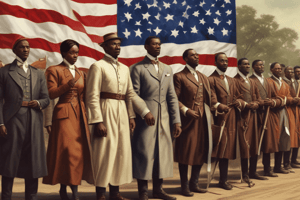Podcast
Questions and Answers
When did Reconstruction begin?
When did Reconstruction begin?
- Before the war ended (correct)
- With Lee's surrender at Appomattox
- After the assassination of Abraham Lincoln
- When the radical Republicans seized control of Congress
Black codes, including vagrancy laws had which of the following effects?
Black codes, including vagrancy laws had which of the following effects?
- Criminalized black leisure
- Limited black mobility
- Locked many into exploitative farming contracts
- All of the above (correct)
How did the Fourteenth Amendment change American governance?
How did the Fourteenth Amendment change American governance?
- Asserted the federal government's power to enforce the Bill of Rights over the authority of the states (correct)
- Divided the U.S. South into five military zones to ensure the creation of fair state governments
- Made slavery illegal in all American states
- Abolished vagrancy laws in the South
In addition to election reform, what other major accomplishment did black delegates achieve?
In addition to election reform, what other major accomplishment did black delegates achieve?
General William T. Sherman's Special Field Order No. 15 was intended to do which of the following?
General William T. Sherman's Special Field Order No. 15 was intended to do which of the following?
Which of the following goals of freedpeople was the least successful?
Which of the following goals of freedpeople was the least successful?
How did black churches help develop political organization in black communities?
How did black churches help develop political organization in black communities?
Why did women's rights leaders oppose the Fourteenth Amendment?
Why did women's rights leaders oppose the Fourteenth Amendment?
What was the term for the African American ladies memorial association that arranged the mourning for Union soldiers buried in Charleston?
What was the term for the African American ladies memorial association that arranged the mourning for Union soldiers buried in Charleston?
What terrorist tactics did white southerners use to enforce racial hierarchies?
What terrorist tactics did white southerners use to enforce racial hierarchies?
Why did the Ku Klux Klan attack Allen Huggins?
Why did the Ku Klux Klan attack Allen Huggins?
What was the most common labor pattern in postbellum cotton agriculture?
What was the most common labor pattern in postbellum cotton agriculture?
The Depression of 1873 began when a prominent business declared bankruptcy. What was the name of that company?
The Depression of 1873 began when a prominent business declared bankruptcy. What was the name of that company?
The Compromise of 1877 did which of the following?
The Compromise of 1877 did which of the following?
Flashcards are hidden until you start studying
Study Notes
Reconstruction Era
- Reconstruction began before the Civil War ended, specifically with Lee's surrender at Appomattox.
- The Radical Republicans gained control of Congress, pushing for significant changes in governance.
Impact of Black Codes
- Black codes criminalized leisure activities of African Americans and limited their mobility.
- They locked many African Americans into exploitative farming contracts, restricting economic freedom.
Fourteenth Amendment
- Asserted federal authority to enforce the Bill of Rights over states, enhancing civil rights protections.
- It did not eradicate slavery across the nation but focused on ensuring citizenship rights for African Americans.
Contributions of Black Delegates
- Black delegates significantly revised state constitutions in the South, particularly establishing public school systems to improve education access.
General Sherman’s Field Order No. 15
- Aimed to create homesteads for freed people by setting aside land in Georgia and South Carolina.
Goals of Freedpeople
- Gaining access to land was the least successful goal among freedpeople, while reuniting families and attending schools were relatively more successful.
Role of Black Churches
- Black churches served as essential venues for political meetings and leadership training, fostering political organization within black communities.
Opposition to the Fourteenth Amendment
- Women's rights leaders opposed the Fourteenth Amendment because it was the first time the word "male" was introduced into the Constitution, sidelining women's rights.
African American Ladies Memorial Association
- Known as the Patriotic Association, they organized mourning for Union soldiers buried in Charleston, showcasing community support and memory.
Terrorist Tactics by White Southerners
- White southerners employed violence, targeting black candidates, voters, and freedpeople attempting independence, reinforcing racial hierarchies.
Attack on Allen Huggins
- Allen Huggins, a white sheriff supporting African Americans' civil rights, was targeted by the Ku Klux Klan for his stance and actions.
Labor Patterns in Postbellum Cotton Agriculture
- Sharecropping became the most common labor system, replacing traditional forms of labor and creating cycles of debt and dependency.
Depression of 1873
- Triggered by the bankruptcy of Jay Cooke and Company, this financial crisis had widespread economic repercussions.
Compromise of 1877
- Resulted in the promise to remove federal troops from the South, significantly impacting Reconstruction efforts and ending the era.
Studying That Suits You
Use AI to generate personalized quizzes and flashcards to suit your learning preferences.




